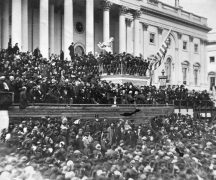In chapter 22 of Luke’s Gospel, Jesus performs the famous “words of institution” as part of the inaugural Eucharist, a ceremony repeated over two thousand years later by the faithful. Despite knowing that his betrayer was sitting at the same table as his other disciples, Jesus allowed Judas to consume the bread and wine, in other words, to receive communion.
Somehow, the notion of God’s son allowing one “who would have been better to have never been born” to partake in the same ritual as those other apostles seems strange to the Pharisaic bishops of the Catholic Church today who seek to deny the same Eucharist to politicians who hold a pro-choice position. Regardless of the morality or immorality of abortion, contraception, etc. there seems to be no scriptural support for denying a person, politician or otherwise, of this sacred sacrament. St. Paul tells us “None is righteous, no not one” (Romans 3:10). That includes, by the way, all popes throughout history as well as Bishop Thomas (Diocese of Toledo).
Strictly speaking, nobody deserves communion but through his selfless act, God allows even the betrayer of his own self to partake of it. Whence comes therefore the Pharisaic notion that one must be in some vague state of “purity” before coming into God’s presence? Jesus seems to have predicted such controversies when he said, “This people honors me with their lips, but their heart is far from me; in vain do they worship me, teaching as doctrines the commandments of men.” (Mark 7:6-7). Curiously, Jesus seems to have had another president in mind when he said, “Whoever divorces his wife and marries another commits adultery against her.” (Mark 10:11).
Perhaps these Bishops would do well to take the beam out of their own eyes before noticing the speck of dust in the eyes of their brethren (Luke 6:41)? As I remember correctly, the priest in Findlay, Ohio who was charged with unspeakable crimes was “high up” on the Bishop’s list (in the event that the Bishop was unable to fulfill his duties, a committee known as the “College of Consultors”, of priests that included the priest in question would take over responsibilities until a new bishop was named or the acting bishop was able to resume his duties). Perhaps Bishop Thomas can abstain from communion himself as “penance” for promoting a man accused of heinous crimes to such a high position?
I would like to close with a bit of advice from the Apostle to the Gentiles: “But avoid foolish controversies…dissentions and quarrels…for they are unprofitable and worthless.” (Titus 3:9).
William Kennedy, M.T.S.
Pemberville, Ohio



